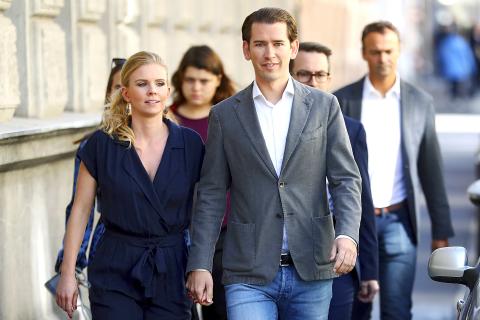Former Austrian chancellor Sebastian Kurz was expected to emerge victorious from yesterday’s snap parliamentary election, but it remained unclear whether the conservative leader would lean left or to the far right in seeking the coalition partner he needs for a majority.
The election follows the collapse in May of Kurz’s coalition with the far-right Freedom Party (FPO) after a video sting scandal that forced then-Austrian vice chancellor Heinz-Christian Strache of the FPO to step down.
Kurz, 33, has remained largely unscathed from the scandal, even gaining voters from the FPO as its support has slipped to roughly one-fifth of the electorate from a little more than a quarter in the last vote in 2017.

Photo: AP
“We are very confident. We have a clear goal, namely to come first in this election. We want to improve our result,” Kurz told reporters before casting his vote in Vienna, referring to the 31.5 percent that his People’s Party (OVP) achieved in 2017.
Few doubt he will meet those objectives.
The overall picture since the scandal’s immediate aftermath has been remarkably stable. Opinion polls have generally shown Kurz’s OVP far ahead on about one-third of the vote, the Social Democrats slightly ahead of the FPO and the resurgent Greens a distant fourth.
Kurz has said he would talk to all parties if he wins the election.
His two most likely choices are either to ally with the FPO again or with the Greens and liberal Neos. A centrist coalition with the Social Democrats is possible, but unlikely under their current leadership.
Surveys suggest the environment is voters’ top concern, which has lifted the Greens from less than 4 percent of the vote at the last election to about 13 percent in recent opinion polls.
While they might be able to give Kurz and his party a narrow majority in parliament, he is unlikely to want to be at the mercy of a small number of its left-wing lawmakers.
That means that if he does ally with the Greens he would probably seek a three-way deal including the liberal, pro-business Neos.
It could take time for the Greens and Kurz to convince their supporters about working with each other.
Many Greens voters see Kurz as their enemy since he brought the far right to power, while many of Kurz’s core voters, such as farmers and big business, are wary of the left-wing Greens.
As the campaign wound up last week, the FPO sought to focus attention on its core issue of migration.
“It is hard to so say what will happen,” FPO leader Norbert Hofer said.

LONG FLIGHT: The jets would be flown by US pilots, with Taiwanese copilots in the two-seat F-16D variant to help familiarize them with the aircraft, the source said The US is expected to fly 10 Lockheed Martin F-16C/D Block 70/72 jets to Taiwan over the coming months to fulfill a long-awaited order of 66 aircraft, a defense official said yesterday. Word that the first batch of the jets would be delivered soon was welcome news to Taiwan, which has become concerned about delays in the delivery of US arms amid rising military tensions with China. Speaking on condition of anonymity, the official said the initial tranche of the nation’s F-16s are rolling off assembly lines in the US and would be flown under their own power to Taiwan by way

‘OF COURSE A COUNTRY’: The president outlined that Taiwan has all the necessary features of a nation, including citizens, land, government and sovereignty President William Lai (賴清德) discussed the meaning of “nation” during a speech in New Taipei City last night, emphasizing that Taiwan is a country as he condemned China’s misinterpretation of UN Resolution 2758. The speech was the first in a series of 10 that Lai is scheduled to give across Taiwan. It is the responsibility of Taiwanese citizens to stand united to defend their national sovereignty, democracy, liberty, way of life and the future of the next generation, Lai said. This is the most important legacy the people of this era could pass on to future generations, he said. Lai went on to discuss

MISSION: The Indo-Pacific region is ‘the priority theater,’ where the task of deterrence extends across the entire region, including Taiwan, the US Pacific Fleet commander said The US Navy’s “mission of deterrence” in the Indo-Pacific theater applies to Taiwan, Pacific Fleet Commander Admiral Stephen Koehler told the South China Sea Conference on Tuesday. The conference, organized by the Center for Strategic and International Studies (CSIS), is an international platform for senior officials and experts from countries with security interests in the region. “The Pacific Fleet’s mission is to deter aggression across the Western Pacific, together with our allies and partners, and to prevail in combat if necessary, Koehler said in the event’s keynote speech. “That mission of deterrence applies regionwide — including the South China Sea and Taiwan,” he

UNPRECEDENTED: In addition to the approved recall motions, cases such as Ma Wen-chun’s in Nantou are still under review, while others lack enough signatures The Central Election Commission (CEC) announced yesterday that a recall vote would take place on July 26, after it approved the first batch of recall motions targeting 24 Chinese Nationalist Party (KMT) lawmakers and Hsinchu Mayor Ann Kao (高虹安). Taiwan is in the midst of an unprecedented wave of mass recall campaigns, following a civil society push that echoed a call made by Democratic Progressive Party (DPP) caucus whip Ker Chien-ming (柯建銘) in January to initiate signature drives aimed at unseating KMT legislators. Under the Civil Servants Election and Recall Act (公職人員選舉罷免法), Taiwanese can initiate a recall of district-elected lawmakers by collecting